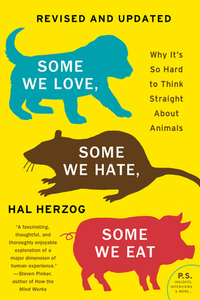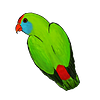Take a photo of a barcode or cover
171 reviews for:
Some We Love, Some We Hate, Some We Eat: Why It's So Hard to Think Straight About Animals
Hal Herzog
171 reviews for:
Some We Love, Some We Hate, Some We Eat: Why It's So Hard to Think Straight About Animals
Hal Herzog
So my parents have a hobby farm turned business farm with a wide variety of animals (GEE Funny Farm) and my mom is always looking for good books to recommend for animal education. Often she passes on her recommendations to my dad, and in this case he passed on the recommendation to me.
What an interesting read! Most of this book is informative. It's written for popular culture, but it's well-researched. He shares what are good studies and what are bad studies, and he manages to do it in such an engaging (and sometimes funny way). He introduces a wide range of people and he introduces them with respect I think, although he doesn't always agree with them. Among the topics he discusses: the ethics of pet owning (not something I had really considered), the inconsistencies of human nature regarding animals, a little bit about the laws (or lack of laws) governing the use of animals in testing, about the history of dog breeding and trends in dog owning, about what attracts us to some animals and what repulses us from some animals, etc.
Hal Herzog himself is not an all-out animal activist (though he studies them), which makes him more accessible to me. He admits that he justifies the eating of meat, though he does work hard to do it with consideration for the animals. He concludes by persuasively arguing that while human nature leads us to be inconsistent, we could perhaps work harder to align our beliefs with our actions, even if we are never perfect at it.
What an interesting read! Most of this book is informative. It's written for popular culture, but it's well-researched. He shares what are good studies and what are bad studies, and he manages to do it in such an engaging (and sometimes funny way). He introduces a wide range of people and he introduces them with respect I think, although he doesn't always agree with them. Among the topics he discusses: the ethics of pet owning (not something I had really considered), the inconsistencies of human nature regarding animals, a little bit about the laws (or lack of laws) governing the use of animals in testing, about the history of dog breeding and trends in dog owning, about what attracts us to some animals and what repulses us from some animals, etc.
Hal Herzog himself is not an all-out animal activist (though he studies them), which makes him more accessible to me. He admits that he justifies the eating of meat, though he does work hard to do it with consideration for the animals. He concludes by persuasively arguing that while human nature leads us to be inconsistent, we could perhaps work harder to align our beliefs with our actions, even if we are never perfect at it.
On finishing the book, I find that my earlier thoughts were justified. The text seems kind of rambling, and while that is due in part to the subject matter, I think it could have been more cohesive. Easily readable, but not entirely memorable, I found myself struggling to remember particular studies/points the author mentions after just having previously read it in the chapter I just finished even though some people and concepts are re-introduced without reference to their prior appearance in the book. I would say the best part of the book was that it did make me think about my relationship to animals - being an omnivore the chapters on animals as food were particularly relevant. And therein lies the book's chief value - to make me/us more aware of the larger world in which we live and from which we draw sustenance.
We're at a paradox. I love my doggy. I love fried chicken. This leaves me thinking, and thinking, and thinking about vegetarianism. I got to find more delicious fake recipes.
Really great examination of why we feel the way we do about animals, from pets to mice to cows. A lot more humorous than you would think...
At home, I have a bearded dragon, a cat, and a brand new leopard tortoise with a respiratory infection. (pictures at the end)
Before buying both the bearded dragon and the leopard tortoise, I did my research, as of course anyone should do before investing in a pet, particularly an exotic pet. So when Genbu (that's the tortoise) developed a runny nose after coming home, I knew from my research that he was probably a carrier of a type of bacteria leopard tortoises are particularly sensitive to and that develops into infections when they are stressed, such as from a move. So he went to the vet and $300 later we are waiting on the test results, he has been deworned and force-fed, and we have to give him a shot in his pectoral muscle every other day for 20 days.
While we were going over the course of watching Genbu carefully, taking him to the vet and now, taking care of him, I was reading this book. For the first time it actually made me think, why am I investing time and money into a tiny little 3'' tortoise? He does not purr like my cat or curl up on my lap. He does not provide me with warmth and he doesn't play. He doesn't talk like another human companion would.
Back when I got my bearded dragon (Loki), I also did my research, kept an eye on her, and took her to the vet when she had a parasite infection. She did not have to have shots, but have you ever tried to stick a syringe into a lizard's mouth? It's pretty difficult and they do have claws. At the time, I thought nothing of it. She was my pet, and I had a responsibility to her even as she was slicing up my hands in a perfectly justifiable effort to get away from the weird plastic thing jammed in her mouth.
This book has made me wonder why I feel that way. I mean, I don't kill anything. I do eat meat (though not a lot), which is something the book addresses, the contradiction of animal lovers who still eat meat or condone medical testing, etc. But I won't kill anything. Not ants, not pigeons, not game animals or anything else. I feel a connection to animals that don't really give back a whole lot in terms of communication.
In fact, the animals I like are the animals most people are afraid of or that they don't care much about. I have heard people concerned that Loki is going to escape from her cage and bite me one night (the idea is completely ridiculous. My lizard is a scaredy cat who is afraid of strawberries) or that Genbu might be vicious (he eats hay. Like a horse). People find it difficult to empathize with reptiles.
The book addresses that, why people empathize with some animals (dogs, cats) and not others (mice, lizards) and don't care about eating others (pigs, cows). There's a wealth of information in here, and yes, some of it is really hard to read. One anecdote has stuck with me for quite some time, and involves guinea pig death for absolutely no reason that I can comprehend. If you like animals, some parts of this book are really difficult to read.
I think it's an important book though. Whether you are vegeterian/vegan/omnivore, whatever, whether you hunt, let your cat outside, volunteer for an animal rescue, or could care less about animals, it's still important to read. I mean, like it or not, we share the whole world with them, and there are more of them than there are of us. The way we treat them says something about us as a whole.
Loki.

Loki and Genbu.

Sneakers the cat.

Before buying both the bearded dragon and the leopard tortoise, I did my research, as of course anyone should do before investing in a pet, particularly an exotic pet. So when Genbu (that's the tortoise) developed a runny nose after coming home, I knew from my research that he was probably a carrier of a type of bacteria leopard tortoises are particularly sensitive to and that develops into infections when they are stressed, such as from a move. So he went to the vet and $300 later we are waiting on the test results, he has been deworned and force-fed, and we have to give him a shot in his pectoral muscle every other day for 20 days.
While we were going over the course of watching Genbu carefully, taking him to the vet and now, taking care of him, I was reading this book. For the first time it actually made me think, why am I investing time and money into a tiny little 3'' tortoise? He does not purr like my cat or curl up on my lap. He does not provide me with warmth and he doesn't play. He doesn't talk like another human companion would.
Back when I got my bearded dragon (Loki), I also did my research, kept an eye on her, and took her to the vet when she had a parasite infection. She did not have to have shots, but have you ever tried to stick a syringe into a lizard's mouth? It's pretty difficult and they do have claws. At the time, I thought nothing of it. She was my pet, and I had a responsibility to her even as she was slicing up my hands in a perfectly justifiable effort to get away from the weird plastic thing jammed in her mouth.
This book has made me wonder why I feel that way. I mean, I don't kill anything. I do eat meat (though not a lot), which is something the book addresses, the contradiction of animal lovers who still eat meat or condone medical testing, etc. But I won't kill anything. Not ants, not pigeons, not game animals or anything else. I feel a connection to animals that don't really give back a whole lot in terms of communication.
In fact, the animals I like are the animals most people are afraid of or that they don't care much about. I have heard people concerned that Loki is going to escape from her cage and bite me one night (the idea is completely ridiculous. My lizard is a scaredy cat who is afraid of strawberries) or that Genbu might be vicious (he eats hay. Like a horse). People find it difficult to empathize with reptiles.
The book addresses that, why people empathize with some animals (dogs, cats) and not others (mice, lizards) and don't care about eating others (pigs, cows). There's a wealth of information in here, and yes, some of it is really hard to read. One anecdote has stuck with me for quite some time, and involves guinea pig death for absolutely no reason that I can comprehend. If you like animals, some parts of this book are really difficult to read.
I think it's an important book though. Whether you are vegeterian/vegan/omnivore, whatever, whether you hunt, let your cat outside, volunteer for an animal rescue, or could care less about animals, it's still important to read. I mean, like it or not, we share the whole world with them, and there are more of them than there are of us. The way we treat them says something about us as a whole.
Loki.

Loki and Genbu.

Sneakers the cat.

challenging
informative
reflective
medium-paced
Really enjoyed the varied perspectives brought up throughout this book. Thoughtful and thought provoking!
challenging
emotional
informative
medium-paced
Made me super glad I read that article in Utne Reader that made me quit eating mammals at 14. Now if I could just kick the chicken habit...
informative
fast-paced
Good at giving a whole picture of how we interact with domestic animals, but doesn't necessarily pose anything interesting or revolutionary. Pretty dated, considering this was published in 2010. The whole gender section seems particularly old-fashioned.
I totally agree with Herzog about people's inconsistent thinking being something we can't truly get around.
Unfortunately, Herzog's writing was painful for me and largely unscientific. The book is mostly anecdotes and armchair-philosopher-type thoughts. In the first chapter he discussed how we have to take scientific studies with a grain of salt because of biases that can creep into the presentation or confounding factors, but then he presents tons of studies' findings as fact without mentioning how they could be/are not necessarily reliable. And THEN he presented tons of contradictory anecdotes, trying to prove points about things, and not recognizing those contradictions. It was too much sometimes, especially on gender differences in feelings about animals where he kept saying women tend to be more sensitive but then also showing tons of his male friends who are sensitive. I get that there is a difference between statistics and anecodtes; does Herzog?
All in all I was hoping for a book that presented more findings of studies, or maybe case studies from the author (it sounds like he's done some interesting research and the cockfighting chapter seemed like the best researched for sure). What I got was a jumble of anecdotes with random findings thrown in seemingly haphazard. Definitely agree with another reviewer that his style was too buddy-buddy for my taste. The weird thing is that I agree with Herzog's final conclusion that people are simply full of contradictions. I just wish he had gotten there in a more studied way rather than telling me such a crazy number of anecdotes.
Unfortunately, Herzog's writing was painful for me and largely unscientific. The book is mostly anecdotes and armchair-philosopher-type thoughts. In the first chapter he discussed how we have to take scientific studies with a grain of salt because of biases that can creep into the presentation or confounding factors, but then he presents tons of studies' findings as fact without mentioning how they could be/are not necessarily reliable. And THEN he presented tons of contradictory anecdotes, trying to prove points about things, and not recognizing those contradictions. It was too much sometimes, especially on gender differences in feelings about animals where he kept saying women tend to be more sensitive but then also showing tons of his male friends who are sensitive. I get that there is a difference between statistics and anecodtes; does Herzog?
All in all I was hoping for a book that presented more findings of studies, or maybe case studies from the author (it sounds like he's done some interesting research and the cockfighting chapter seemed like the best researched for sure). What I got was a jumble of anecdotes with random findings thrown in seemingly haphazard. Definitely agree with another reviewer that his style was too buddy-buddy for my taste. The weird thing is that I agree with Herzog's final conclusion that people are simply full of contradictions. I just wish he had gotten there in a more studied way rather than telling me such a crazy number of anecdotes.




